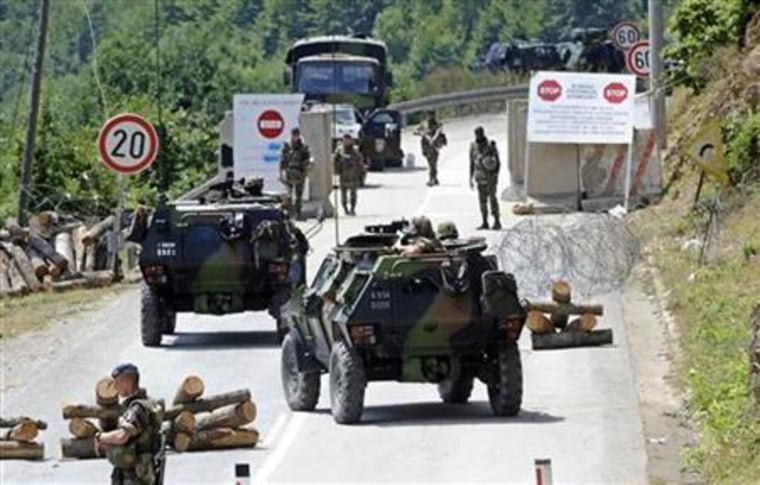The NATO mission in Kosovo said Wednesday that it had drafted an agreement with Serb representatives to move roadblocks in northern Kosovo, but the Pristina government said the deal was unacceptable.
NATO said all roadblocks would be removed and its soldiers would continue to control two border posts into mid-September. Serb activists burned one of them last week and an ethnic Albanian policeman was shot dead.
"Roadblocks will be removed and freedom of movement will be re-established," a NATO statement said, adding that the agreement could be implemented in the days to come. Cars and trucks may pass after an identity check and a weapons search.
The Kosovo government said the agreement was unacceptable and would not be implemented.
"The government of Kosovo considers the draft agreement which was presented for opinion between KFOR Gen. Erhard Buhler and Serb official (Borislav) Stefanovic as unacceptable," the government said in a press statement. KFOR is the NATO mission that has around 6,000 troops in Kosovo.
Kosovo wants to place its own ethnic Albanian police and customs officers at the two main Serbia border crossings, Brnjak and Jarinje.
Pristina ordered ethnic Albanian special police units July 25 to wrest control of the two northern border crossings to enforce a Serb-imports ban, which it said was being ignored by ethnic Serb members of Kosovo's border police. The import ban is reciprocity for Serbia and Bosnia and Herzegovina blocking Kosovo exports.
One ethnic Albanian police officer was killed and four were injured in the ensuing clashes with ethnic Serbs.
NATO troops stepped in on Friday, but ethnic Serbs prevented them from reaching peacekeepers deployed at the border posts. They blocked two main northern Kosovo roads with trucks, trailers, logs and car tires stalling all traffic to and from the border.
"The government of Kosovo will fully respect the reciprocity (trade) measures with Serbia," meaning Pristina control over trade at the border crossings.
The U.S. said its Embassy in Kosovo was not informed of Pristina's border action in advance and did not approve its approach.
Kosovo declared independence in 2008, but the 60,000 Serbs living in northern Kosovo still consider Belgrade their capital. Serbia does not recognize Kosovo's independence.
Kosovo has banned all imports from Serbia and imposed a 10 percent tax on imports from Bosnia in retaliation for the two countries' 3-year-old block on Kosovo exports.
Serbia and Kosovo have held talks in Brussels to resolve the trade dispute, as part of an EU-mediated dialogue that aims to untangle a host of differences that make it difficult for Kosovo to function as a state.
The talks have made progress but diplomats say the latest round collapsed in July when Serbia rejected a compromise on customs stamps.
Some 90 percent of the people in Kosovo are ethnic Albanians, while a sizeable Serb minority lives in the north, near Serbia. The other Kosovo Serbs are scattered in enclaves throughout Kosovo.
Serbia lost control of Kosovo in 1999, when NATO waged a 78-day bombing campaign to end Yugoslav leader Slobodan Milosevic's ethnic cleansing and crackdown on ethnic Albanian rebels.
